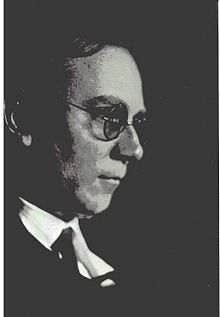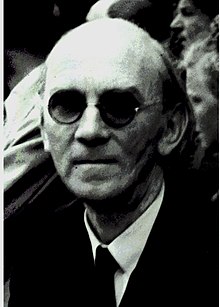Dietzenschmidt
Dietzenschmidt , b. as Anton Franz Schmid (not Schmidt ), as a poet always without a first name just called Dietzenschmidt (* December 21, 1893 in Teplitz , † January 17, 1955 in Esslingen am Neckar ) was a German playwright who did the religious for the professional and amateur stage Drama enlivened with modern means of expression.
resume
Dietzenschmidt was born in Teplitz in 1893 as the son of the accountant Franz Schmid and his wife Albina Maria Förster. He lived in Berlin from 1913 and had his stage name Dietzenschmidt recognized as a civil name in 1927. From 1941 he lived in Baden ( Freiburg , Bonndorf in the Black Forest ). At the same time he kept his place of residence in Bohemia from childhood until he was expelled in 1945 (initially in Brüx , later in Karlsbad ).
Dietzenschmidt's ancestors belong to the Germans who, following the invitation of the then king, immigrated "from Swabia" to the outskirts of Bohemia in the twelfth century. Mostly simple people: cottagers, farmers, craftsmen. Dietzenschmidt's father had worked his way up as a hatter to a manufacturer. Both of the poet's parents died when he was seventeen. The adolescent's own life was endangered by the then almost incurable tuberculosis . Doctors at the University of Prague succeeded in healing with arsphenamine, which had just been discovered , but the heart remained weakened in the long run, with two-dimensional scars on the face and paralysis of the left leg, the recovered person remained visibly marked forever.
A near-death experience during this time (as it has since been reported by many others), the experience of a phase of deepest peace and absolute unity with everything, made the religious skeptic a seeker of God. His inner path led predominantly through the mystical branches of the great world religions, “until the overflowing, surging variety of mystical currents flowed into the calm, calm, sun and god-shined lake of clear, pure water: all mysticism in humble simplicity, unconditional love and the good news of Christ embracing divine awe ”(quote from Dietzenschmidt's autobiography from 1953). From then on he lived the vocation and duty to convey the redeeming insight to other people. His motto at the time: “My office is love. All office be love. "
He recognized the drama as the medium of his proclamation : discussion of fates and tensions in current events on the stage. His often crude representation of this world always refers to a force and power beyond the tangible, which creates, shapes and ultimately holds everything that is.
At the turn of the century, the youth movement and life reform had turned away from the rigid forms and contents of life of the previous epoch. This renewal was also taken up by religious associations, such as the Bühnenvolksbund in the German Empire and the German-Bohemian youth associations. Dietzenschmidt was one of their spiritual leaders. His conception of human guilt and divine grace (core of the religious drama) was based on personal experience and was by no means always in accordance with the teaching of the official church. The youths and young adults in Bohemia, however, with whom he created amateur and impromptu games and with whom he had to discuss after lectures, understood and accepted his kind of religious dialectic , as did the leaders of these groups.
Dietzenschmidt's lyric texts create (sometimes intimate) erotic, religious and historical experiences in a conventional way. He only published such poems on the side or not at all.
The National Socialist regime did not want Dietzenschmidt as a playwright because of his themes from Jewish and Christian tradition. After all, after 1933 he was still allowed to write art reports for the Berliner Tageblatt until it closed at the end of January 1939. After that, he was a freelance writer, supported by the Archbishop of Freiburg , Conrad Gröber . Dietzenschmidt was a member of the Reichsschrifttumskammer . He survived the time of need after the end of the war penniless and exhausted. He proved his skills one last time when he wrote a festival in 1951 for the award of the town charter of the municipality of Bonndorf in the Black Forest and arranged the performance with adult amateur actors. Apart from that, despite numerous plans, he was unable to make a new start as an artist. Since 1945 only a few youth groups have performed pieces by Dietzenschmidt.
Services
In 1919 Dietzenschmidt received the Kleist Prize together with Kurt Heynicke . From 1921 he was a member of the art council of the Kleist Foundation in Berlin. In the 1920s he was successful as a Catholic playwright in the entire German-speaking area. In 1928 he received the Czechoslovak State Prize for German Poetry. Since 1926 he has given lectures and led amateur play groups at Werkwochen of the Reich Association of German Catholic Working Youth in Bohemia, in the borderland adult education center "Heimgarten" of Quickborn in Neisse-Neuland and with the German Catholic youth in Poland. In 1930 he was a co-founder and board member of the Sudeten German Culture Society (Berlin), which, until the Munich Agreement in 1938, drew attention to Sudeten German cultural activity with exhibitions, lectures and concerts. From 1933 to the beginning of 1939 he worked for the Berliner Tageblatt (editor-in-chief at times Paul Scheffer , features editor Paul Fechter ).
Works
Dramas
- The expulsion of the Hagar . A tragedy. Berlin: Oesterheld & Co. Verlag, 1916.
- Yeruzhalayim's queen. A tragedy. Berlin: Oesterheld & Co. Verlag, 1919.
- Little slave . A tragic comedy in four acts. Berlin: Oesterheld & Co. Verlag, 1918. First performance in Berlin with Ida Orloff in the title role. Also filmed [1] .
- Christofer. A big and beautiful legend game. Würzburg: Patmos, 1920. First performance in Königsberg, Artistic Director Richard Rosenheim , title role Robert Müller.
- The Sanct Jacobs ride. Eyn legend game in three elevators. Berlin: Oesterheld & Co. Verlag, 1920. Original for the opera “Die Jakobsfahrt” by Fidelio F. Finke .
- Brother Vitalis's nights. Drama in three acts. Berlin: Oesterheld & Co. Verlag, 1922.
- Mary's seventh glory. based on a central Dutch game from the 15th century in five acts. Frankfurt am Main: Verlag des Bühnenvolksbund, 1924.
- Regiswindis . A game in three acts. Frankfurt am Main: Verlag des Bühnenvolksbund, 1924.
- Persecution. A nightmare in seven stations. Stuttgart: German publishing house, 1924.
- From dear Augustine. Folk comedy with music, song and dance in 3 acts. Berlin: Oesterheld & Co. Verlag, 1925. First performance in Kassel, artistic director Paul Bekker , incidental music by Ernst Krenek .
- Murder in the Secret Annex. Three acts. Berlin: Oesterheld & Co. Verlag, 1927 (not 1917). First performance as "Secret Annex" at the Staatstheater Berlin under Leopold Jessner with Alexander Granach and Veit Harlan .
- The traitor of God. Four acts. Berlin: Oesterheld & Co. Verlag, 1929. Piece about Judas Ischariot .
- Hodie scietis, quia veniet Dominus! Today you will find out that the Lord is coming. A folk liturgical game celebration. Berlin-Südende: Volkschaft-Verlag for books, theater and film, 1934.
- Bonndorf, my Bonndorf ...! Bonndorf's walk through history: a festival. Bonndorf in the Black Forest: Beschle o. J. ((C) Dietzenschmidt 1951). Reprint Bonndorf in the Black Forest: City of Bonndorf in the Black Forest , 1991. ISBN 3-925016-84-8 .
prose
- King death. Novels and legends. Berlin: Oesterheld & Co. Verlag, 1918
- The escape and children's crusade . Two stories. Berlin: Düwell & Franke, 1932.
- Hundreds of art reports for the Berliner Tageblatt .
literature
- Max Brod : The Prague Circle . Suhrkamp, Frankfurt / M. 1984, ISBN 3-518-37047-2
-
Paul Fechter : The European Drama. Spirit and culture in the mirror of the theater . Bibliographical Institute, Mannheim 1958
- 3. - From Expressionism to the Present
- Kurt Augustinus Huber: Catholic Church and Culture in Bohemia. Selected treatises. Hers. by Joachim Bahlcke and Rudolf Grulich . Münster: Verlag LIT, 2005. ISBN 3-8258-6687-4
- Daniel Langhans: The Reich Association of German Catholic Youth in Czechoslovakia 1918-1938 . Cultural Foundation of the German Expellees , Bonn 1990, ISBN 3-88557-084-X
- Josef Mühlberger : History of German literature in Bohemia 1900-1939 . Langen Müller, Munich 1981, ISBN 3-7844-1879-1
- Helmut Sembdner (Ed.): The Kleist Prize 1912-1932 . Schmidt, Berlin 1968
- Jürgen Serke : Bohemian Villages. Wanderings through a deserted literary landscape . Zsolnay, Vienna 1987, ISBN 3-552-03926-0
- Rainer Stommer: The staged national community. The " Thing Movement" in the Third Reich . Jonas-Verlag, Marburg 1985, ISBN 3-922561-31-4
- Johannes Czech (Ed.): Dietzenschmidt. An autobiography from the poet's estate with an introduction and samples from his poems . Königstein Institute for Culture and History of East Central Europe, Königstein / T. 1958 (with catalog raisonné)
- Carl Zuckmayer : Secret report . Dtv, Munich 2005, ISBN 3-423-13189-6
Web links
- Literature by and about Dietzenschmidt in the catalog of the German National Library
- Schmidt (Dietzenschmidt), Anton Franz . In: East German Biography (Kulturportal West-Ost)
- Dietzenschmidt - a Christian poet from Northern Bohemia A tribute to the church historian Prof. Dr. Rudolf Grulich
Individual evidence
- ↑ Kürschner's German Literature Calendar 1943, p. 191.
| personal data | |
|---|---|
| SURNAME | Dietzenschmidt |
| ALTERNATIVE NAMES | Schmid, Anton Franz (birth name); Dietzenschmidt, Anton Franz (real name from 1927) |
| BRIEF DESCRIPTION | German playwright |
| DATE OF BIRTH | December 21, 1893 |
| PLACE OF BIRTH | Teplitz |
| DATE OF DEATH | 17th January 1955 |
| Place of death | Esslingen am Neckar |


